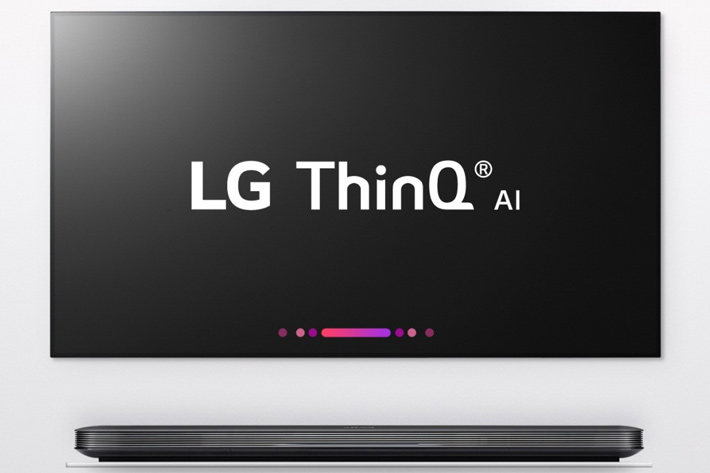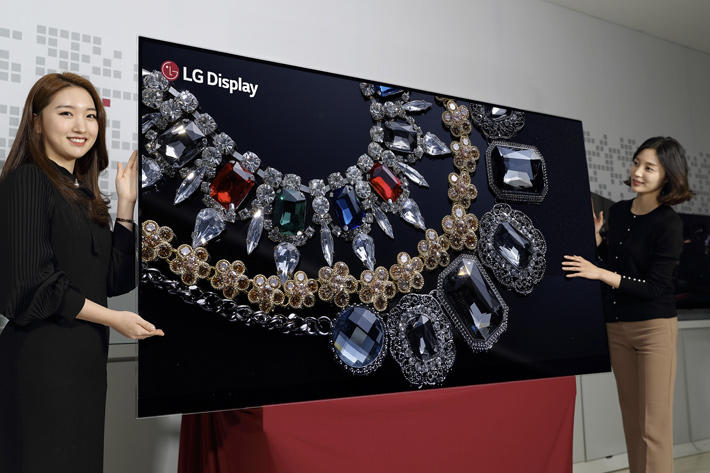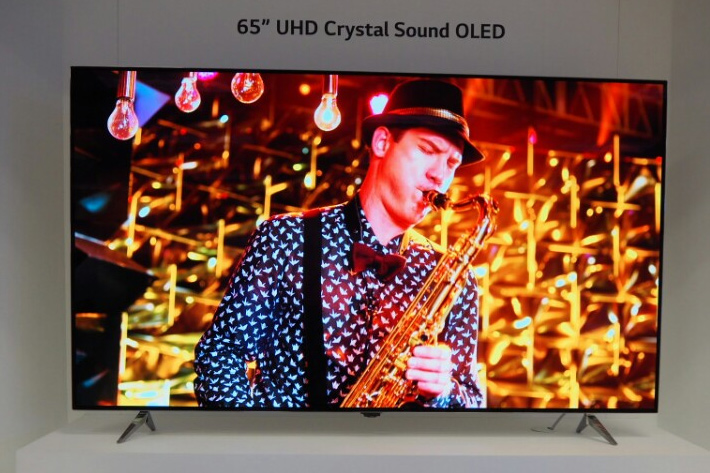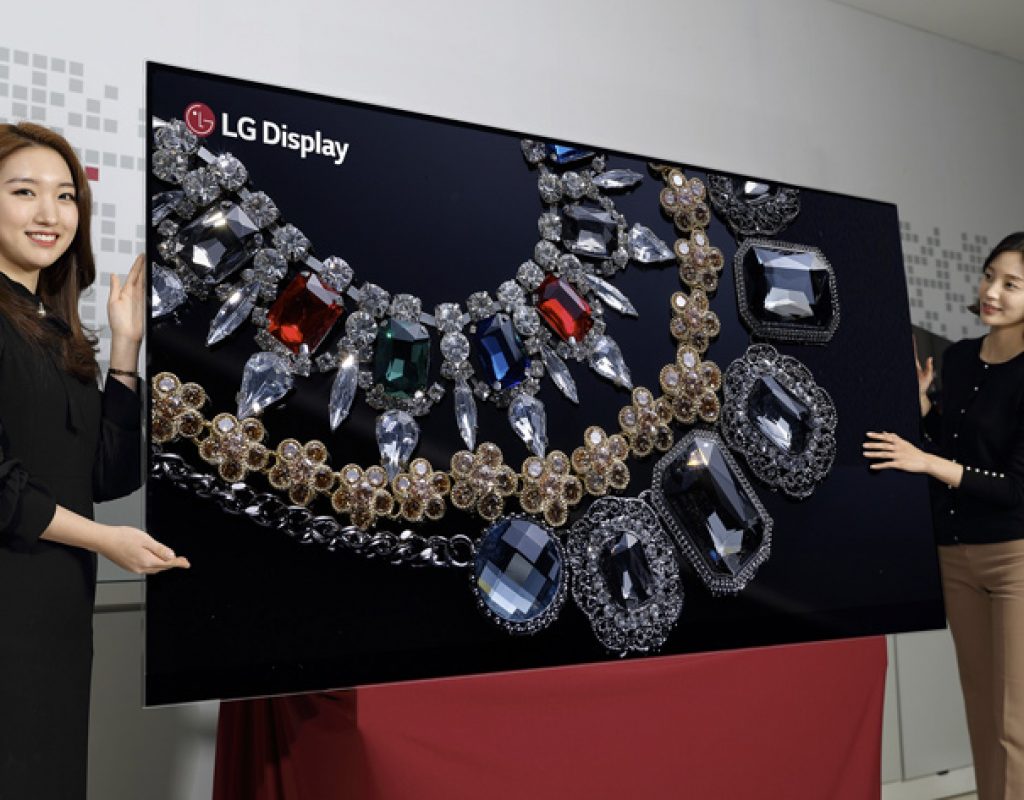
LG lays groundwork for TV of tomorrow with ThinQ technology and a new (Alpha) processor, suggesting that the industry needs to focus on the brains behind the display for future development. CES 2018 is the stage for the presentation.
With prices dropping and quality going up, every brand will have some new TV sets to show at CES 2018. Even 8K will be present although it is, not yet at least, main stream. LG will showcase its massive 88-inch OLED display ready for 8K reception. Samsung, Panasonic and Sharp will also share their solutions, and Sony will not want to be left behind, having recently filed for the “8K HDR” trademark and logo in Europe, United States and Japan, according to thew website FlatpanelsHD.
HDR (High Dynamic Range) will be a popular reference at CES 2018, and it will be interesting to see how different brands follow the VESA standard for HDR. OLED is also going to be a key element, with Sony, LG and others showing their new solutions, but there is still space for LCD models, as they tend to be more accessible in terms of price, and the quality continues to go up.
LG goes to CES 2018 with the suggestion that the company is preparing the future ot TV, with the introduction of ThinQ artificial intelligence (AI) and an advanced image processor in its newest OLED and SUPER UHD TVs. ThinQ allows the implementation of hundreds of voice requests utilizing the company’s own open smart platform as well as third-party AI services.
With AI functionality embedded in their TVs, LG customers can speak directly into the remote control to enjoy all the convenient features of today’s advanced voice assistant technology. LG’s ThinQ TVs also function as smart home hubs, offering access to other smart home products such as robotic vacuum cleaners, air conditioners, air purifiers, smart lights, smart speakers and many other devices that can connect to the TV via Wi-Fi or Bluetooth.

LG’s ThinQ offers an enhanced interactive experience in the company’s newest smart TV lineup, including OLED and SUPER UHD TV models by employing Natural Language Processing (NLP) to deliver intelligent voice-activated control and connectivity based on LG’s own deep learning technology, DeepThinQ. With a dramatically streamlined setup process, viewers can easily and quickly connect to gaming consoles and external soundbars. Users can search for information, images or videos featuring specific content by making a verbal request through the TV’s remote control such as “show me all the movies this actor has starred in” or “show me yoga videos”.
LG TVs with ThinQ AI supports services based on Electronic Program Guide (EPG) to deliver information in real time or change to a channel that offers the content requested. Instruct the TV to “search for the soundtrack of this movie” or “turn off the TV when this program is over” without repeating the name of the program or entering a specific time. What’s more, customers in certain countries will be able to utilize the Google Assistant to control smart home devices such as lights or activate third-party services.
Is this important information for you as a content creator? I believe so, because it reflects how content will be perceived by the public, and in the end, at one moment or another, we’re also consumers of content. Besides, the ThinQ is just one side of the whole story, as LG also introduced an advanced image processor in its newest OLED and SUPER UHD TVs, the α (Alpha) 9 processor.
LG’s newest α (Alpha) 9 intelligent processor provides true-to-life images with incredibly rich colors, sharpness and depth for more realism. A core innovative element of the α (Alpha) 9 is the four-step process of noise reduction, which boasts twice as many steps compared to conventional techniques. This algorithm allows for greater finesse in noise reduction, improving the clarity of images affected by distracting artifacts and enabling more effective rendering of smooth gradations.
The processor also improves color performance, thanks to the advanced mapping capabilities make colors look closer than ever to the original content. The improved color correction algorithm allows for more natural colors by expanding the reference color coordinates seven-fold compared to before. α (Alpha) 9 is designed to support high frame rate (HFR) for producing smoother and clearer motion images at 120 frames per second for better rendering of fast-action content such as sports and action movies. As a result of the new image processor, says LG, “2018 LG OLED TVs can display any content at maximum quality for a truly spectacular viewing experience.”
In 2017, LG made a significant achievement toward its highly ambitious vision for producing the ultimate LCD TV picture through its Nano Cell SUPER UHD TVs. By combining Nano Cell, Full-Array Local Dimming (FALD) backlighting and the α (Alpha) 7 processor, LG’s 2018 SUPER UHD TV offers a host of technological advantages including deeper blacks, enhanced image rendering, improved shadow details and accurate color from wide viewing angles.

This year’s SUPER UHD TV with FALD allows for denser backlighting zones throughout the display, contrary to edge-lighting where backlights are positioned on the edges behind the TV panel. LG’s technology improves black levels and picture dimensions by independent control of LED light zones, improving shadow details and reducing light bleeding resulting in enhanced contrast and superb picture quality.
2018 OLED and SUPER UHD TVs from LG feature 4K Cinema HDR, which introduces a truly cinematic experience to the home, regardless of the format. LG’s 2018 OLED and SUPER UHD TVs add support for Advanced HDR by Technicolor, building on a legacy of supporting most major HDR formats, from the superior viewing experience of Dolby Vision to HDR10 and HLG (Hybrid Log-Gamma). LG’s 2018 OLED and SUPER UHD TVs process HDR images dynamically frame by frame using LG’s proprietary algorithm, Enhanced Dynamic Tone mapping. Both 2018 OLED TVs and SUPER UHD TVs come with Dolby Atmos object-based surround sound for the best audio-visual experience possible.
“LG is continually seeking to innovate in home entertainment and LG ThinQ along with the α (Alpha) 9 processor will deliver a TV viewing experience that is unrivaled in the industry,” said Brian Kwon, president of LG’s Home Entertainment Company. “At LG, our interest is in improving user lifestyles and convenience, which our 2018 TVs amply deliver.”

Filmtools
Filmmakers go-to destination for pre-production, production & post production equipment!
Shop Now













